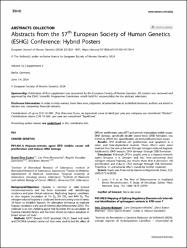| dc.contributor.author | Gezik, Ceren | |
| dc.contributor.author | Durmaz, Durmuş | |
| dc.contributor.author | Güleç, Çağrı | |
| dc.contributor.author | Toksoy, Güven | |
| dc.contributor.author | Berkay, Ezgi Gizem | |
| dc.contributor.author | Başaran, Seher | |
| dc.contributor.author | Özsait Selçuk, Bilge | |
| dc.date.accessioned | 2025-04-02T06:40:09Z | |
| dc.date.available | 2025-04-02T06:40:09Z | |
| dc.date.issued | 2025 | en_US |
| dc.identifier.citation | Gezik C, Durmaz D, Güleç Ç, Toksoy G, Berkay EG, Başaran S, Özsait Selçuk B. Role of MUTYH gene variants in the etiology of recurrent pregnancy loss. 57th European Society of Human Genetics (ESHG), 2025, v.32, 1298-1299. | en_US |
| dc.identifier.issn | 1018-4813 | |
| dc.identifier.issn | 1476-5438 | |
| dc.identifier.uri | https://www.webofscience.com/wos/woscc/full-record/WOS:001421430501470 | |
| dc.identifier.uri | https://www.nature.com/articles/s41431-024-01734-4 | |
| dc.identifier.uri | https://hdl.handle.net/20.500.12780/1070 | |
| dc.description.abstract | Background/Objectives: Recurrent pregnancy loss (RPL), is
defined as the loss of two or more pregnancies before 24 weeks
of gestation that affects 1-2% of pregnancies worldwide. The
cause of RPL cannot be explained in about half of the cases.
Recent studies suggest that mitochondrial dyshomeostasis and
oxidative stress may play a role in RPL. The mutY DNA glycosylase
(MUTYH) is a novel candidate gene in RPL involved in repair of
oxidative stress induced DNA damage. This study aimed to
investigate the association of MUTYH gene variants and RPL.
Methods: Variant analysis was performed on whole exome
sequencing data from 10 couples and an additional 25 female
patients examined due to the RPL in the first trimester.
Results: All patients had normal karyotypes and had no other
causing factor related to infertility. In three female patients (8%),
heterozygous pathogenic missense (rs143353451 and
rs374950566) and nonsense (rs121908380) variants were detected
in MUTYH gene. Protein modeling of these variants was performed
by UniProt automated modeling and showed that mutated MUTYH residues are located within conserved motifs at the surface
of the molecule.
Conclusion: Findings of this study suggest that pathogenic
variants of MUTYH gene might be crucial in the trigger of oxidative
stress in human placenta and thus contribute to RPL etiology.
Additive interaction of other heterozygous variants in RPL related
genes should be explored and further functional studies should be
conducted to explain the role of these variants in female infertility. | en_US |
| dc.language.iso | eng | en_US |
| dc.publisher | Springer Nature | en_US |
| dc.rights | info:eu-repo/semantics/openAccess | en_US |
| dc.subject | Recurrent pregnancy loss (RPL) | en_US |
| dc.subject | Mitochondrial dyshomeostasis | en_US |
| dc.subject | Oxidative stress | en_US |
| dc.subject | MUTYH | en_US |
| dc.subject | DNA | en_US |
| dc.title | Role of MUTYH gene variants in the etiology of recurrent pregnancy loss | en_US |
| dc.type | conferenceObject | en_US |
| dc.contributor.department | İstanbul Kent Üniversitesi, Fakülteler, Diş Hekimliği Fakültesi, Temel Bilimler Bölümü | en_US |
| dc.contributor.authorID | 0000-0002-1967-705X | en_US |
| dc.contributor.institutionauthor | Berkay, Ezgi Gizem | |
| dc.identifier.volume | 32 | en_US |
| dc.identifier.startpage | 1298 | en_US |
| dc.identifier.endpage | 1299 | en_US |
| dc.relation.journal | 57th European Society of Human Genetics (ESHG) | en_US |
| dc.relation.publicationcategory | Konferans Öğesi - Uluslararası - Kurum Öğretim Elemanı | en_US |


















